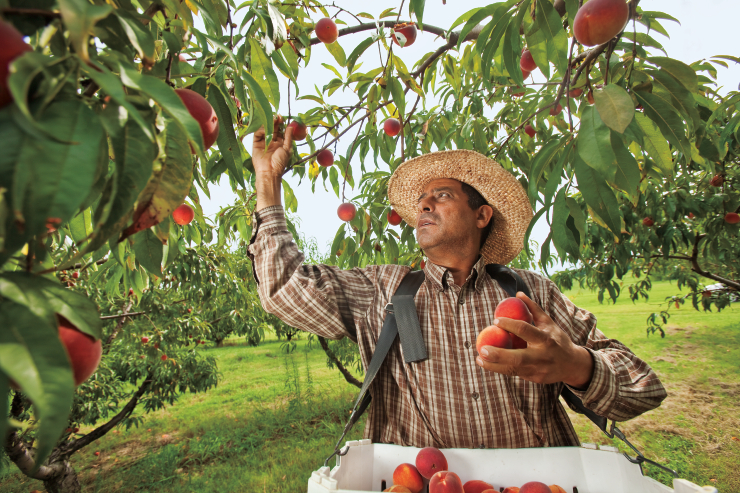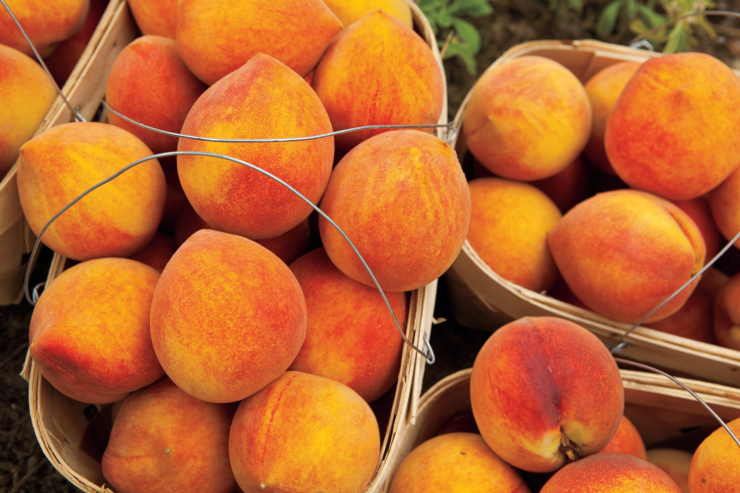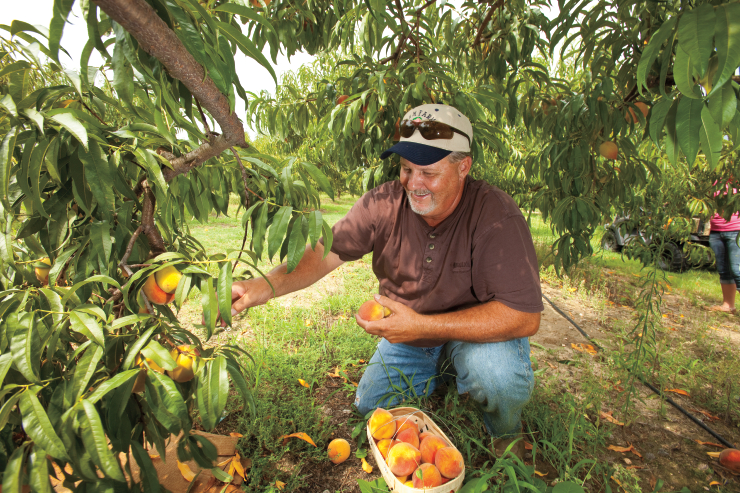Home > Alabama > Alabama Agritourism > A Real Peach: Alabama’s Top Commercial Fruit Boosts Economy
A Real Peach: Alabama’s Top Commercial Fruit Boosts Economy

Mark Knight wanted nothing to do with peaches after he graduated from high school and moved out on his own.
Some 34 years later, Knight talks about his peaches like they were his children.
“We’re proud of our peaches,” says Knight, who owns a relatively small orchard in the peach capital of Alabama, Chilton County. “We can take a little better care of them (than the larger farms can). When you’ve got the number of trees they have, you can’t put your hands on every one of them. And maybe we can’t put our hands on all our trees, but we can take a little more personal care of them.”
Fruitful Production
Whether they’re from the small, family-owned farms or the large operations, peaches are an important part of the agriculture industry’s role in the Alabama economy. Peaches are Alabama’s leading commercial fruit, and the state ranks 18th in peach production in the United States. Alabama orchards produced 5,700 tons of peaches in 2011, according to the USDA’s National Agriculture Statistics Service.
Most of those peaches came from Chilton County, which accounts for more than two-thirds of the state’s cultivation.
“Peaches are important here in Chilton County,” says Gary Gray, regional extension agent for Central West Alabama and the Black Belt.
Chilton County, which has about 2,500 acres of peach trees, is prolific in peach production because of a couple of reasons, according to Gray.
“Spring freezes are the primary limiting factor to peach production in Alabama,” he says. “Chilton County’s hilly terrain provides enough difference in elevation to allow denser, colder air to drain away to lower elevations, creating a warmer micro-climate along the ridge tops and higher elevations.
“Also, Chilton County has well-drained soils, which are necessary for peach production.”

A Family Affair
Peaches have been in the Knight family for three generations. His grandfather and father grew the fruit, and though Knight had pursued other work after graduating high school in 1979, he took over the operation after his parents died in 2003. He now has about 3,000 peach trees on 40 acres.
Knight’s peaches are award winners as well, having earned “best of the best” the last four years at the annual Peach Festival in Clanton.
“It’s been in our family for a long time,” Knight says of his peach business, M&M Farms. “I also have a small lawn service business and my wife works at Walmart, because we still have to do other things to make ends meet.”
As most owners of the smaller farms do, Knight sells the biggest portion of his peaches through farmers markets and other open-air markets. He distributes some to a produce place in Tennessee and to a couple of A&P stores, but says most are sold through his M&M Farms booth. His wife, Melissa, and daughters Andrea and Alissa usually handle sales from the booth at The Shoppes at Eastchase in Montgomery.
“I enjoy growing peaches,” Knight says, “but I didn’t ever think I would. When I got out of school and left home, I didn’t want to ever do any more farming. But you know how it goes. You get older and you realize it wasn’t that bad.”

The Big Peach
Henry Williams is in the Alabama peach business on a much larger scale. With his 120-acres and nearly 14,000 trees in Chilton County, he is a principal supplier of peaches for the Durbin Farms retail outlet off Interstate 65 in Clanton.
Williams began his career in farming after getting his master’s degree in soil science from Auburn University in 1983. He says about half of his peaches go to Durbin, where he’s had a partnership since 1994, and the rest go to roadside markets throughout the Southeast as well as to a wholesaler in Birmingham for distribution to places like New Orleans, Dallas and Jackson, Miss.
Williams hires about 20 employees for the peach season, which typically runs from May through early September, primarily through the H-2A temporary agriculture program.
It takes about 70 seasonal employees to manage the growing period at Jim Durbin Farms, which is also in Chilton County but is not associated with the Durbin Farms retail market. On 500 acres, Jim Durbin Farms has 45,000 active peach trees and another 15,000 that will produce within the next year or so.
“Our peaches are the Sunshine brand, and we ship to major wholesalers that distribute to places like Walmart, Bruno’s and Winn-Dixie stores,” says Cindy Phillips, office manager for the farm.
Jim Durbin Farms also has a packing shed on site, where peaches are processed and packed for shipping and where customers can buy peaches by the half-bushel basket.



